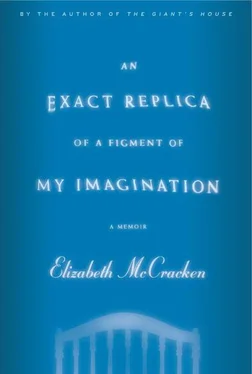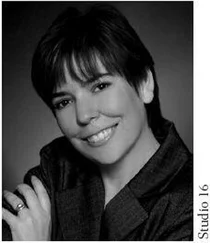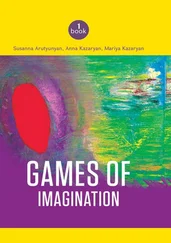Somewhere in there was Mother’s Day. We were with the friends near Angoulême. I lurked in a far doorway and smoked and drank wine by myself. My parents were still in France, and I had to call my mother to wish her a happy day, but I didn’t want to. Was I a mother, I asked myself, and despite Lib’s beautiful e-mail I still don’t know the answer. I want to tell that sad version of myself, Of course you’re a mother, just one who’s learned a hard lesson . I want to tell that sad version of myself, I’m sorry, no, it’s tough luck, he died before you met him, people keep track of such things, and if we call you a mother, then where does it stop? It was the uncertainty that seemed unbearable to me. Even now. This year I had a very glorious baby with me, but was it my first Mother’s Day, or my second?
Those weeks were miserable with company and travel, with luggage and making conversation, but they were forward movement. One step farther, one step farther.
We almost had to take one mammoth step back. Immigration at the ferry terminal in Portsmouth was a single thin man behind a single thin podium. His days must have been dull, waving on one EU passport after another, the French coming to England, the English returning home, an occasional intrepid German, none of whom could be stopped and questioned. When he saw my U.S. passport, he perked up.
“Are you traveling alone?”
“No,” I said. I gestured to Edward, who’d gone ahead. “With my husband, who’s an English citizen.”
This is, by the way, not a useful thing to say, and it’s not the first time I’ve gotten in trouble with Her Majesty’s Border Guards: three and a half years before, a woman at Heathrow asked me the purpose of my visit, and I had said, cheerily, “I’m getting married!” The English are as suspicious of undocumented spouses of citizens as the Americans are: they worry you will assume a certain level of privilege and never get around to sorting yourself out legally. At Heathrow the woman made me sit down on a bench for a long time, next to an athlete from Ghana who was likewise waiting for clearance, and let me through only after a long lecture about not overstaying my six-month tourist allowance. In Portsmouth, the thin border guard perked up further, in the manner of a dog who, already sitting up straight, sits up straighter to show that he’s obeying a command and deserves a biscuit. In fact he looked like a Jack Russell terrier with dreams of being promoted to bloodhound. He began to leaf through my passport.
“It looks to me as though you’ve spent most of the last two years in the United Kingdom,” he said with a certain joy. I couldn’t figure out how he’d arrived at this theory.
“No,” I answered truthfully. “Three weeks a year, at the most.”
“Well, that’s not what it looks like to me,” he said.
We went back and forth. My years as a librarian always help me in such situations: I am very good at keeping my cool with officious, insistent strangers, though my training is on the other side of the desk. I was miraculously polite. Even so it seemed for a while that he might put me on the next ferry back to France. What will I do? I wondered. I pictured myself alone on the ferry, having been manhandled on board by some as yet unseen immigration thug. I tried to explain myself, I tried to remember the exact dates and circumstances of my handful of visits to England. Again and again he told me that it seemed that I’d been illegally living in the United Kingdom. I shifted from foot to foot for forty-five minutes as he did his best to catch me in an inconsistency.
When, exactly, might we be moved to unpack the shoulder bag, show him the death certificate of very recent vintage, open the tiny blue nylon sack, and pull out the wooden urn of ashes with the brass plaque underneath that said, Pudding Harvey, Bordeaux, 2006 ? Look, we might have said, something terrible has happened to us. Grant us a tiny bit of grace no matter what you think.
Two things saved us. First, I explained that Edward planned to immigrate to the United States at the end of the summer.
“Have you begun that process?” he said.
I reeled off the name and number of every single form I’d filled out.
Then he asked us what we did for a living, and I said tiredly, “We’re writers.”
He perked up again, like a Jack Russell terrier who dreams of being a famous Jack Russell terrier. I’d seen that look before: As it happens, I fancy myself a writer.
“Books?” he asked.
“Yes,” I said. “I’ve published three, and my husband has published two.”
That seemed to do the trick. He took down the particulars of my passport, stamped it, wrote down a code, and waved us through. We were almost free when he called out —
“Would I find your books in a bookstore?”
“Yes,” I said as pleasantly as I could, backing away from him. I could smile for only so long. I was worried I’d wasted my year’s supply on this man.
Here is a character from a gothic novel: the woman with the stillborn child. Her hair is matted and black. Ghosts nest in it. Her white nightgown is mottled with blood. In her hands is an awful bundle: the corpse she cannot bear to put down. She sings lullabies to it, rocks it in her arms. She says in a pleasant but tremulous voice, Would you like to see my baby? He’s such a nice little baby. Such a little, little baby. Shh: he’s sleeping .
Maybe she’s a ghost, dead in childbirth herself. Better hope for that. Ghosts are terrifying but not so bad as a woman ruined by the death of her child.
I was not that woman in the months after Pudding’s death. I didn’t weep in company. I mostly didn’t mention the fact that I had been pregnant, that everything in my life was supposed to be different. I felt bad that I made people feel bad for me. I was corseted by politeness: I could feel my organs, rearranged by pregnancy, squeezed now in completely different directions.
But I felt like that gothic character. At least, I felt like people looked at me as though I were, whenever I did mention the baby or his death or my pregnancy. I could almost see myself with my uncombed hair and filthy nightgown, the tiny corpse in a winding sheet in my arms, walking down a nineteenth-century street as I knocked on doors. I could hear my voice: Would you like to see my baby?
This for the merest reference to what had happened to me.
I was a character from an opera who might at any moment let loose with an aria, and generally people tried to cover it up with conversational ragtime. People changed the subject. They smiled uncomfortably. Some tried extraordinary juggling acts, with flung torches of chitchat and spinning scimitars of small talk.
They didn’t mention it. They did not say, I am so sorry or How are you?
I felt in those first weeks, meeting people I knew, like the most terrifying object on earth.
Who knows what other people think? Not me, and especially not then. Still it surprised me, every time I saw someone who didn’t mention it. I am writing this and trying to remember how it felt at the time, and trying to imagine what people were thinking. I am trying to remember what I have thought when I’ve done the same thing, all those times I didn’t mention some great sadness upon seeing someone for the first time. Did I really think that by not saying words of consolation aloud, I was doing people a favor? As though to mention sadness I was “reminding” them of the terrible thing?
As though the grieving have forgotten their grief?
I remember one lunch with people who loved us in London early on, two of the most excruciating hours of my life. Nothing but that endless juggling: Other people’s jobs and boyfriends. What kind of wine to order. This was two weeks after Pudding died. I might have been something like that gothic character one step short of total ruin: I wanted to rock and sing lullabies and hold out my torn, bloody nightgown and run my hands through my wild hair, and yet I knew you weren’t supposed to do such things in polite society. My hair was uncombed, and my face was puffy from lack of sleep and crying and too much wine, and my clothes were what I’d salvaged from the middle of my pregnancy, because of course even though people might pretend nothing was out of the ordinary I had the body of a woman two weeks postpartum, soft and wide around the middle, and if I’d been one step worse off I might have lifted my shirt up to display my still livid stretch marks.
Читать дальше












